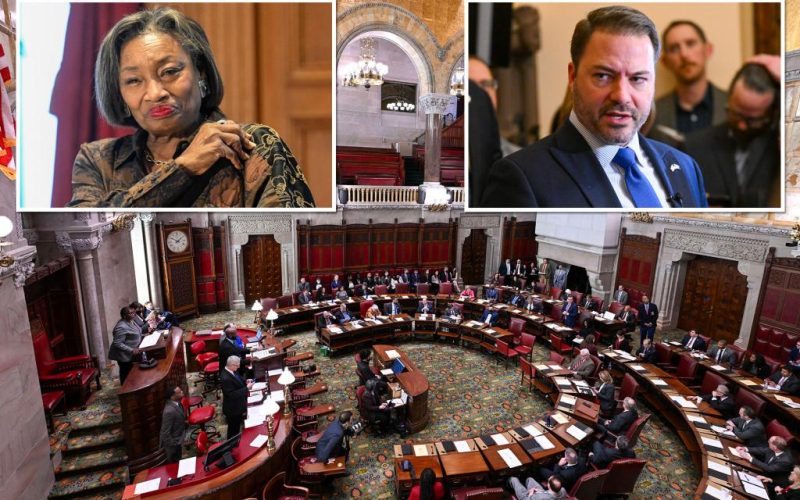NYS Senate GOP will need Democrat permission to attend session remotely

[ad_1]
ALBANY – State lawmakers are already the highest-paid legislators in the country at $142,000 per year – and now they can work from home, too.
Under new legislative rules approved Thursday, Democratic leaders can now determine what qualifies as “extraordinary circumstances” that would let state Senators and Assembly members attend sessions by video rather than showing up in the state Capitol.
The move left Republican state senators crying foul because state Senate Majority Leader Andrea Stewart-Cousins (D-Yonkers) will get to decide who gets the remote-work permission slips among GOP and Democratic members alike.
“I think its really quite petty that they treat us like children,” state Sen. Anthony Palumbo (R-Brentwood) told The Post.
The situation is much different in the lower house where Assembly Speaker Carl Heastie (D-Bronx) and Minority Leader William Barclay (R-Fulton) will respectively call the shots for their own conference members, according to their plans for implementing the new rules.

Palumbo said he worried how a Democratic state senator could hypothetically head on an “emergency vacation to Hawaii” while Republican senators struggle to get approval to attend sessions remotely.
“It’s quite petty and outrageous to not just allow the leaders from each party to make the calls,” Palumbo said.
A quorum of members in both houses will have to be physically present in the state Senate and Assembly chambers to allow vote-by-video attendance for others “in extraordinary circumstances or any other significant or unexpected factor or event,” according to the legislative language.

Some Republicans find the change particularly ill-timed considering how colleagues made themselves the highest-paid legislators in the nation after giving themselves a $32,000 pay raise in a December special session.
“It’s horrible,” state Sen. George Borello (R-Jamestown) said. “They want this elected position to become a $142,000 no-show job.”
But Democrats argue Stewart-Cousins – a spokesman did not provide comment Thursday – will be judicious in making decisions on what situations are extraordinary enough for her to allow a senator to attend sessions by video.

“Each house has its own procedures. The majority leader always has final say, even on excusals currently. That’s always the way it’s been going back to before we held the majority,” State Senate Deputy Majority Leader Michael Gianaris (D-Queens) said.
Republicans are needlessly fretting about Stewart-Cousins favoring fellow Democrats in the future, according to Gianaris.
“In practice, there’s deference to the minority leader for their conference so it’s unlikely this will ever be an issue,” he added.
Democrats note that other public bodies allow members to attend by video following the passage of a state law last year – an idea backed by the good government group Reinvent Albany at a legislative hearing last week.

Still, some Republican senators remain suspicious that Democrats will leverage the situation to their advantage considering the vagueness of the rule language – as well as past power plays from across the aisle that include packing a key committee with opponents of centrist court nominee Hector LaSalle.
“Democrats get to define what “extraordinary circumstances” are and have a history of using remote session to literally mute Republican voices,” state Sen. Mark Walczyk (R-North Country) said.
[ad_2]
Source link

